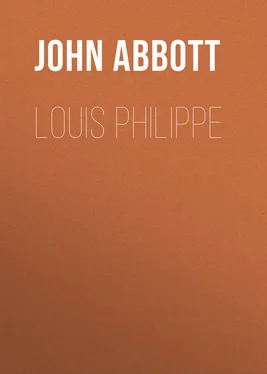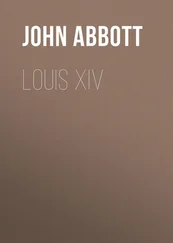John Abbott - Louis Philippe
Здесь есть возможность читать онлайн «John Abbott - Louis Philippe» — ознакомительный отрывок электронной книги совершенно бесплатно, а после прочтения отрывка купить полную версию. В некоторых случаях можно слушать аудио, скачать через торрент в формате fb2 и присутствует краткое содержание. ISBN: , Жанр: foreign_antique, foreign_prose, Историческая проза, на английском языке. Описание произведения, (предисловие) а так же отзывы посетителей доступны на портале библиотеки ЛибКат.
- Название:Louis Philippe
- Автор:
- Жанр:
- Год:неизвестен
- ISBN:http://www.gutenberg.org/ebooks/28199
- Рейтинг книги:5 / 5. Голосов: 1
-
Избранное:Добавить в избранное
- Отзывы:
-
Ваша оценка:
- 100
- 1
- 2
- 3
- 4
- 5
Louis Philippe: краткое содержание, описание и аннотация
Предлагаем к чтению аннотацию, описание, краткое содержание или предисловие (зависит от того, что написал сам автор книги «Louis Philippe»). Если вы не нашли необходимую информацию о книге — напишите в комментариях, мы постараемся отыскать её.
Louis Philippe — читать онлайн ознакомительный отрывок
Ниже представлен текст книги, разбитый по страницам. Система сохранения места последней прочитанной страницы, позволяет с удобством читать онлайн бесплатно книгу «Louis Philippe», без необходимости каждый раз заново искать на чём Вы остановились. Поставьте закладку, и сможете в любой момент перейти на страницу, на которой закончили чтение.
Интервал:
Закладка:
Embarkation for America.
On the 24th of September, 1796, the Duke of Orleans embarked at Hamburg in an American vessel, "The America," then a regular packet plying between that port and Philadelphia. Still retaining his incognito, he represented himself as a Dane, and obtained Danish passports. He paid thirty-five guineas for his passage, and took with him his ever-faithful servant Baudoin, for whom he paid seventeen and a half guineas. A favorable passage of twenty-seven days landed them at Philadelphia, on the 21st of October, 1796.
Sufferings of the young princes.
We have not space here to describe the cruel sufferings of the two younger brothers of Louis Philippe during their captivity. The elder of the two, the Duke of Montpensier, was but seventeen years of age; the younger, Count Beaujolais, was but thirteen. The brothers were confined separately, in dark, fetid dungeons, and were not allowed any communication with each other. The health of Beaujolais soon began to suffer, and it was evident that he must die unless he could have fresh air. The Duke of Montpensier writes, in his touching autobiography:
"My brother Beaujolais was consequently permitted to spend two or three hours each day in the open air, and was then remanded to his dungeon. His cell being above mine, he was obliged to pass my door on his way out, and he never failed to call out, 'Good-day, Montpensier; how are you?' It is impossible to describe the effect his gentle voice had upon me, or the distress I felt when a day passed without my hearing it; for he was sometimes actually forbidden to utter these words, and was always hurried by so quickly that he had scarce time to hear my answer. Once, however, that he was permitted to remain until my dinner was brought, he kept so close to the heels of the basket-bearer that, in spite of the administrators, who tried to hold him back, he darted into my cell and embraced me. It was six weeks since I had seen him – six wretched weeks. The moment was precious, but how short! He was torn from me forthwith, with threats of being no more allowed to go out should the same scene be repeated. I myself was not afterwards permitted, when my cell door was opened, to go near enough to catch the breeze which passed up the narrow staircase."
Their destitution.
The princes were not allowed to see the public journals, or to receive from their friends any letters which had not been previously examined by their jailers. They were left in entire ignorance of their father's execution until some time after his head had fallen. When the awful tidings were conveyed to them, both of the young princes, weakened by imprisonment and misery, fainted away. The hatred with which they were pursued is evinced by the epithet of wolves' cubs , which was ever applied to them in the clubs of the Jacobins. Eight francs a day were allowed for their support. Their mother had sent to them, for their immediate necessities, twelve thousand francs ($2400); but the magistrates had seized the whole sum. As the weary months rolled on, there were variations in the treatment of the illustrious prisoners – it sometimes being more and sometimes less brutal, but ever marked with almost savage ferocity. After the fall of Robespierre, a decree was passed —
"That the imprisoned members of the Orleans family should have the outer walls of the fort as the limits of their captivity, the privilege of ranging about within those bounds, and in future they were not to be locked up in their cells."
The attempt to escape.
The mother of the princes, the Duchess of Orleans, who had been in close surveillance in the palace of the Luxembourg, in Paris, also experienced very considerable alleviation in the severity of her treatment. From various quarters the captives at length obtained funds, so that their pecuniary wants were supplied. On the 18th of November, 1795, the princes made a desperate but unavailing effort to escape. The breaking of a rope by which Montpensier was endeavoring to let himself down, outside of the walls, precipitated him from a great height to the ground, very seriously breaking one of his legs. He was recaptured, and suffered terribly from mental and bodily anguish. His brother, Beaujolais, having effected his escape, learning of the misfortune which had befallen his brother, returned, with true brotherly love, to voluntary captivity, that he might do something to cheer the sufferer.
Upon the return of Beaujolais, the commandant of the prison said, exultingly, to the Duke of Montpensier, who was writhing upon a bed of bodily suffering and of mental anguish:
"Your young brother is again my prisoner in the fortress, and burns with anxiety to see you. You are henceforth to be confined separately, and will no longer have an opportunity to communicate with each other."
Strong affection for each other.
The two brothers were allowed one short interview. "Ah, brother," said Beaujolais, "I fear we shall derive no benefit from what I have done, for we are to be confined separately. But without you it was impossible for me to enjoy liberty."
For forty days Montpensier was confined to his bed. It was a year and a half before he entirely recovered the use of his broken limb. Thus three years of almost unmitigated wretchedness passed away. There were many massacres in the prison; and often it seemed that miraculous interposition alone had saved them from a bloody death. Gradually the horrors of the Reign of Terror seemed to subside. The captive princes were allowed to occupy a room together, and that a comfortably furnished apartment in the fort, overlooking the sea. It was under these circumstances that the mother consented to their banishment to America, as the condition of their liberation. The Directory, however, would not open their prison doors until it had received official intelligence of the embarkation of Louis Philippe.
The release of the captives.
Immediately upon being satisfied that the Duke of Orleans had sailed from Hamburg, the authorities prepared to release the princes from their captivity, and to send them also to the New World. When all things were ready, General Willot, a humane man, who had arrived at Marseilles with extensive powers, informed them that the hour for their release had come.
"The prisoners at first could scarcely credit their senses. They looked steadfastly at each other; then, throwing themselves into each other's arms, they began to cry, laugh, leap about the room, and for several minutes continued to manifest a temporary derangement."
It would still be a few days before the vessel would sail. Jacobinical fury was such in Marseilles that it was not safe for the princes to appear in public, lest they should be torn in pieces by the mob. They were therefore removed to the house of the American consul, Mr. Cathalan, who had manifested almost a brotherly interest in their welfare.
The contrast.
"It is impossible to describe," writes the Duke Montpensier, in his autobiography, "the sensations I experienced in crossing the draw-bridge, and contrasting the present moment with the frightful occasions on which I had passed it before; the first time, on my entrance into that dismal fortress, where I had been immured for nearly three years of my life; and the second, on my unfortunate attempt to escape from it and recover my liberty. The gratifying reflection that I now trod on it for the last time could with difficulty impress itself upon my mind; and I could not avoid fancying that the whole was a sleeping vision, the illusion of which I was every moment apprehensive of seeing dissipated. On our exit from the fort, we were received by a strong detachment of grenadiers, who conducted us to the sloop."
Being thus placed under the protection of the stars and stripes, the soldiers of the Directory left them, and they repaired immediately from the vessel to the house of the American consul, where several friends had assembled to greet them.
Читать дальшеИнтервал:
Закладка:
Похожие книги на «Louis Philippe»
Представляем Вашему вниманию похожие книги на «Louis Philippe» списком для выбора. Мы отобрали схожую по названию и смыслу литературу в надежде предоставить читателям больше вариантов отыскать новые, интересные, ещё непрочитанные произведения.
Обсуждение, отзывы о книге «Louis Philippe» и просто собственные мнения читателей. Оставьте ваши комментарии, напишите, что Вы думаете о произведении, его смысле или главных героях. Укажите что конкретно понравилось, а что нет, и почему Вы так считаете.












